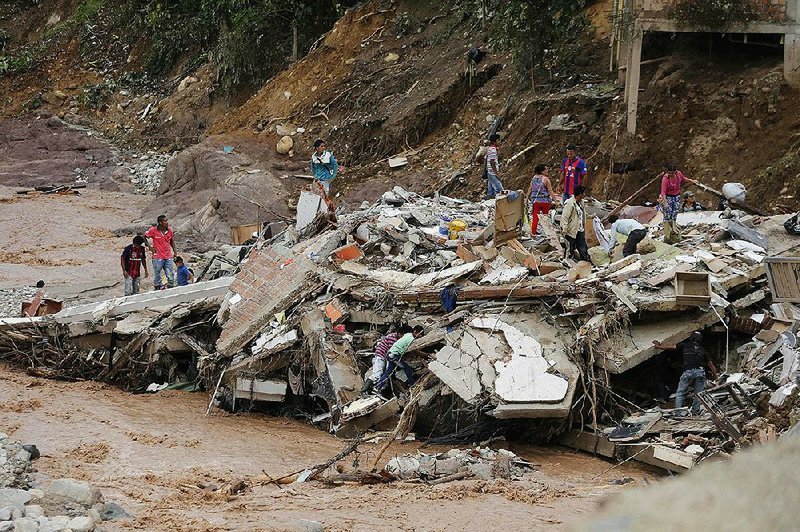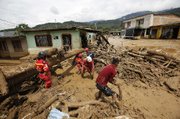MOCOA, Colombia -- People in a small city in southern Colombia searched desperately Sunday for loved ones after heavy rains sent floodwaters, mud and debris surging through homes, killing more than 200 people and leaving many injured or missing.
The streets of Mocoa were covered in thick sand, mud and tree limbs from the rivers and forest that surround the city. With no electricity, authorities were forced to suspend the search and rescue effort during the night.
President Juan Manuel Santos, who visited Mocoa for a second straight day Sunday, declared the area a disaster zone and said the death toll stood at 210. But that could still rise because authorities said there were more than 200 injured, some in critical condition, and people were continuing to locate remains in the debris. The Colombian Red Cross on Sunday put the death toll at 234, while Carlos Ivan Marquez, head of the country's disaster agency, put the toll at 238.
The president said on Twitter that 170 of the dead had been identified. He canceled a trip to Cuba and ordered soldiers to the region.
Santos said the avalanche of water and debris also knocked out power in half of the province of Putumayo, where Mocoa is located, and destroyed the area's freshwater network, creating dangerous and unsanitary conditions.
The city was cut off from many services on Sunday, leaving nearly all residents without electricity, clean water or gasoline; some 600 residents were evacuated to temporary shelters. Survivors used car batteries to recharge cellphones in hopes of contacting loved ones in other towns.
"There's not a single drop of drinkable water -- we need water, that's what's urgent -- and there's nothing to eat," Marisol Gonzalez, the head of a nearby technological institute, told the newspaper El Tiempo.
Throughout Mocoa, people dug through the ruins, salvaging what they could of their possessions and looking for the missing. Dozens of people were in the door of a hospital looking for family members who were not on the list of those confirmed injured or dead. Others frantically knocked on the doors of neighbors, hoping to find someone with information about their relatives. Search and rescue teams also combed the rubble for signs of life.
"People went to their houses and found nothing but the floor," said Gilma Diaz, a 42-year-old woman from another town who traveled to Mocoa in search of a cousin.
Juan Chanchi de Ruiz, 74, said the noise of the surging flood woke her up and gave her enough time to get to higher ground. Her house wasn't damaged, but the homes of several neighbors were heavily damaged, and many people were fleeing with their belongings as the river water remained high.
"Around here, there's nobody. Everybody left," she said.
40 of dead under 18
The disaster seemed to hit young people particularly hard. Santos said more than 40 of the dead identified so far were under 18, perhaps because youngsters were already in bed when the floodwaters struck.
Maria Cordoba, a 52-year-old resident who was trying to wash her belongings in a river, said two of her nephews, ages 6 and 11, were killed when their house was destroyed. "The mother as well was totally beaten up" but managed to save her 18-month-old baby, she said.
A rescue worker in an orange jumpsuit emerged from one search area with the body of an infant wrapped in a towel. Not far away, Abelardo Solarte, a 48-year-old resident of Mocoa, held a child's shoe as he helped clear debris.
"You have no idea how many kids there are around here," Solarte said.
Firefighter Carolina Garreta said she had found a 5-year-old boy clinging to a washing machine that had been carried away by the waters.
"He told me that his mother and father were still in the home," she said. "But where he pointed to, there was nothing."
Jair Echarri, who came from a nearby town to help, also struggled to comprehend the loss of so many children.
"I feel an enormous sadness because it's filled with kids' things, toys, clothes, school books," he said, looking at the debris. "I am a father, and this breaks my heart."
The devastation was caused by intense rains that forced the rivers that surround Mocoa, a city of about 40,000 nestled amid forested mountains, to overrun their banks. Muddy water and debris quickly surged through the city's streets, toppling homes, ripping trees from their roots, lifting cars and trucks and carrying them downstream. Many didn't have enough time when the floods struck before dawn to climb on top of their roofs or seek refuge on higher ground.
Mocoa is vulnerable to flooding. It is surrounded by the three rivers in a natural basin created by the surrounding mountains. Environmental experts also noted the area's deforestation, which eliminated some protection from runoff, and said many people built their homes close to the water. But the triggering event for the flood was the more than 5 inches of rainfall that began late Friday.
A 1989 hydrology report for the Agricultural Ministry warned that flooding could happen unless steps were taken to reinforce the riverbanks, channel water away from the town and restore some of the forest. It was not immediately clear why those steps had not been taken. Colombia's attorney general launched an investigation into whether local and national authorities responded adequately to the disaster.
Santos urged patience and said more help was on the way, while acknowledging that there had been "bottlenecks" in the response. He promised that electric power would be restored soon, that water would be brought in and that destroyed parts of the city would be rebuilt.
"The idea is that Mocoa will be better than it was," he said.
Information for this article was contributed by Alba Tobella, Christine Armario and Cesar Garcia of The Associated Press; by Susan Abad, Nicholas Casey and Russell Goldman of The New York Times; and by staff writers of the German Press Agency.
A Section on 04/03/2017

